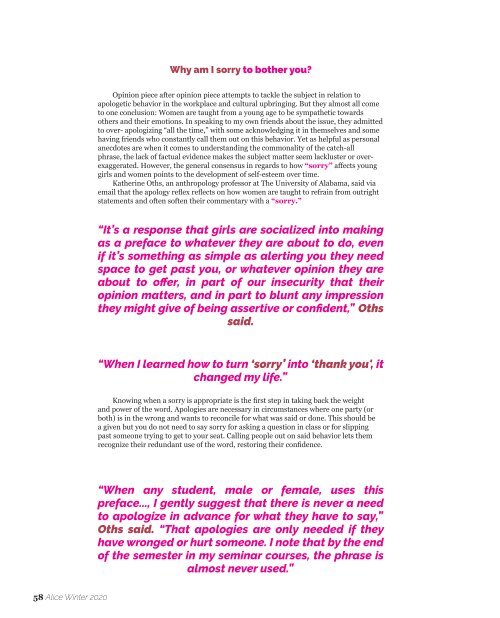Alice Vol. 5 No. 1
Published by UA Student Media in Fall 2019.
Published by UA Student Media in Fall 2019.
You also want an ePaper? Increase the reach of your titles
YUMPU automatically turns print PDFs into web optimized ePapers that Google loves.
Why am I sorry to bother you?<br />
Opinion piece after opinion piece attempts to tackle the subject in relation to<br />
apologetic behavior in the workplace and cultural upbringing. But they almost all come<br />
to one conclusion: Women are taught from a young age to be sympathetic towards<br />
others and their emotions. In speaking to my own friends about the issue, they admitted<br />
to over- apologizing “all the time,” with some acknowledging it in themselves and some<br />
having friends who constantly call them out on this behavior. Yet as helpful as personal<br />
anecdotes are when it comes to understanding the commonality of the catch-all<br />
phrase, the lack of factual evidence makes the subject matter seem lackluster or overexaggerated.<br />
However, the general consensus in regards to how “sorry” affects young<br />
girls and women points to the development of self-esteem over time.<br />
Katherine Oths, an anthropology professor at The University of Alabama, said via<br />
email that the apology reflex reflects on how women are taught to refrain from outright<br />
statements and often soften their commentary with a “sorry.”<br />
“It’s a response that girls are socialized into making<br />
as a preface to whatever they are about to do, even<br />
if it’s something as simple as alerting you they need<br />
space to get past you, or whatever opinion they are<br />
about to offer, in part of our insecurity that their<br />
opinion matters, and in part to blunt any impression<br />
they might give of being assertive or confident,” Oths<br />
said.<br />
You have no reason to apologize for taking up space, whether it be verbally or<br />
physically, so don’t. Save your apologies for when you truly need them and wield<br />
ownership over your words and self-worth.<br />
“I think there’s a bigger issue around sorry, especially<br />
with girls,” Barbie said. “We say it a lot…Like it’s a<br />
reflex, and somehow everything that goes wrong is<br />
our fault.”<br />
This lack of confidence is slowly, but surely, changing and progressing from what<br />
it once was. The power balance is continuing to shift as the wage gap closes and more<br />
women are in positions of leadership across the board. Nevertheless, until we can<br />
raise a generation of women who are shamelessly bold and empowered, the women<br />
of the modern era are going to need to strive towards building one another up while<br />
apologizing less for doing so.<br />
“When I learned how to turn ‘sorry’ into ‘thank you', it<br />
changed my life.”<br />
Knowing when a sorry is appropriate is the first step in taking back the weight<br />
and power of the word. Apologies are necessary in circumstances where one party (or<br />
both) is in the wrong and wants to reconcile for what was said or done. This should be<br />
a given but you do not need to say sorry for asking a question in class or for slipping<br />
past someone trying to get to your seat. Calling people out on said behavior lets them<br />
recognize their redundant use of the word, restoring their confidence.<br />
“When any student, male or female, uses this<br />
preface..., I gently suggest that there is never a need<br />
to apologize in advance for what they have to say,”<br />
Oths said. “That apologies are only needed if they<br />
have wronged or hurt someone. I note that by the end<br />
of the semester in my seminar courses, the phrase is<br />
almost never used.”<br />
58 <strong>Alice</strong> Winter 2020<br />
<strong>Alice</strong> Winter 2020 59


















